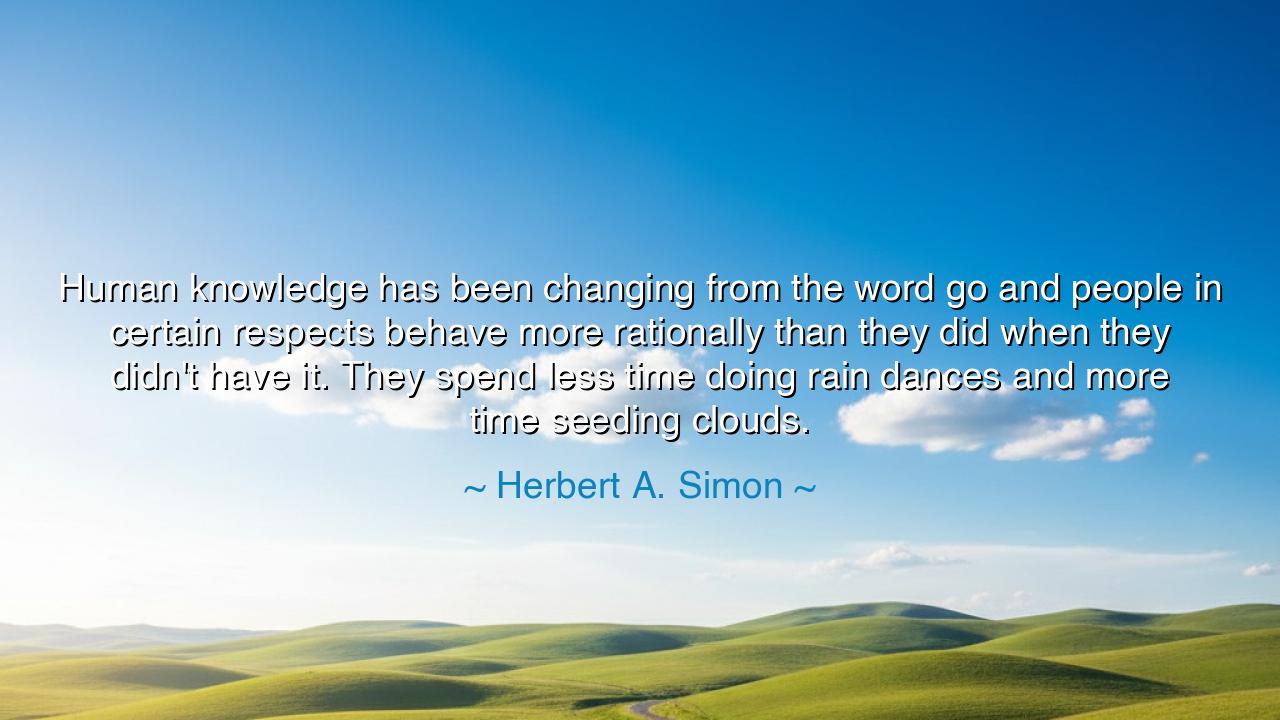
Human knowledge has been changing from the word go and people in
Human knowledge has been changing from the word go and people in certain respects behave more rationally than they did when they didn't have it. They spend less time doing rain dances and more time seeding clouds.






The Nobel laureate and philosopher of mind Herbert A. Simon, one of the great architects of modern thought, once declared: “Human knowledge has been changing from the word go, and people in certain respects behave more rationally than they did when they didn’t have it. They spend less time doing rain dances and more time seeding clouds.” In these words lies both triumph and humility—a recognition of humanity’s long ascent from superstition toward understanding, and yet a quiet reminder that our reason is always evolving. Simon, who devoted his life to studying how humans think and decide, speaks here not merely as a scientist, but as a sage reflecting on the progress of civilization itself.
The origin of this quote comes from Simon’s lifelong inquiry into the nature of human reasoning and the growth of knowledge. Born in 1916, he lived through an age of discovery, from the dawn of computers to the conquest of space. He saw that knowledge was not static but living—growing, adapting, reshaping itself with every generation. He rejected the notion that humanity was ever meant to be bound by ignorance or custom. Instead, he believed that every step forward in understanding, however small, brings light into the darkness of error. When he speaks of “rain dances” and “seeding clouds,” he contrasts the blind rituals of the past with the deliberate experimentation of science—a symbol of mankind’s eternal journey from faith in chance to mastery through reason.
In his poetic metaphor, the “rain dance” stands for the ancient practice of appealing to unseen forces, born from fear and hope intertwined. Our ancestors, facing the uncertainty of the skies, prayed and danced to invite rain for their crops. It was not foolishness—it was the best they knew. But Simon reminds us that humanity has grown. We no longer wait helplessly for rain; we learn the secrets of the clouds, we scatter silver iodide upon them, and we bring forth the storm ourselves. This is not arrogance, but evolution—the transformation of wonder into wisdom, of myth into method. Humanity, through knowledge, learns to act upon nature rather than plead before it.
Yet there is humility even in this progress. Simon does not mock the past, for he knows that knowledge itself is a continuum. The rain dancer and the scientist are not enemies—they are kin, both seeking the same goal: survival, harmony, and control over chaos. The difference is not in spirit, but in understanding. Each discovery builds upon what came before, just as the first spark of fire made possible the forge, and the forge made possible the engine. Humanity advances not by rejecting the past entirely, but by refining it—turning ritual into reasoning, and hope into hypothesis. The changing nature of knowledge is the great story of our species, the tale of our awakening to truth.
Consider the journey of Galileo Galilei, the astronomer who dared to look beyond the heavens of dogma. In his time, to challenge the idea that Earth was the center of the universe was heresy. Yet Galileo, guided not by ritual but by observation, raised his telescope and saw moons circling Jupiter—a revelation that transformed the very shape of human understanding. The priests of his age performed their own kind of “rain dance,” bound to the comfort of tradition. Galileo’s courage to look, to test, to doubt, was the first act of “cloud seeding” in the realm of thought. He taught the world that progress comes not from supplication, but from inquiry.
Simon’s wisdom also warns us that rationality is not an end but a path. He believed that humans, though more rational than their ancestors, are still bounded by limits—by emotion, by bias, by the smallness of perspective. The journey from superstition to science is not complete; we still perform our modern rain dances in other forms—through ideology, greed, and unexamined belief. Yet his tone is not cynical; it is hopeful. For as long as knowledge grows, as long as the mind continues to question, humanity will move closer to wisdom. The very recognition that our knowledge is incomplete is the first sign that we are learning rightly.
O listener, take this truth to heart: knowledge is not a monument, but a living flame. It changes, it evolves, and through it, we rise. Let your curiosity never sleep; let your faith in reason be matched only by your humility before mystery. Do not mock the rain dancers of the past, for they too were seekers—but be grateful that you live in an age where you may seed the clouds yourself. Learn deeply, question boldly, and remember that progress is the child of courage.
Thus, Herbert A. Simon leaves us with a charge: that to be human is to learn, and to learn is to become free. The past may bind us in ignorance, but every act of understanding loosens the knot. From the first spark of thought to the engines that shape the weather, knowledge is our inheritance and our responsibility. And though we may never master all things, it is enough that we continue to strive—that we turn from the dance of desperation to the work of discovery, and in so doing, bring forth the rain ourselves.






AAdministratorAdministrator
Welcome, honored guests. Please leave a comment, we will respond soon